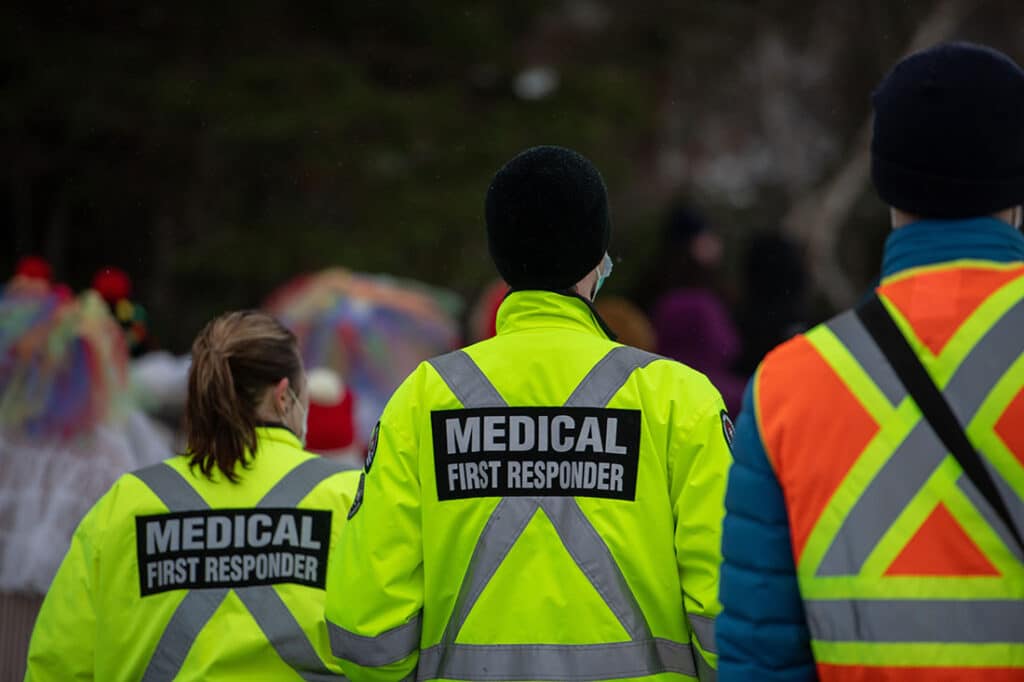We’ve discussed how important training is to help improve your security guards’ skillsets, decrease the risks of something going wrong on the job, and meeting the latest regulatory requirements. Here, we wanted to examine a particular type of training that’s becoming more popular in the industry: Emergency health response.
This training prepares security guards for medical emergencies and other situations where it’s important to reduce harm. It’s not only a value-adding service for your security firm, but it may also be required in the future. Here’s everything you should know.
Emergency Training is Starting to Become a State Requirement
Medical training isn’t just useful for guards to have, it’s starting to become a regulatory issue. Governor Lee of Tennessee, for example, recently signed a new training law for security guards that requires them to receive medical emergency training as well as the typical background checks. This law was created as a specific response to the death of a man who was improperly restrained by bar security guards until he died of asphyxiation. It also places part of the burden on establishments and venues that don’t have properly licensed guards, providing extra incentive for these places to seek firms that have the right medical training.
Laws like these are a win when it comes to liability. If new medical training can prevent guards from accidental injuring or even killing someone during an altercation, it can also stop the lawsuits and fines that can follow. Many other states are taking a closer look at security guard regulations after unfortunate incidents, and requirements like this could become much more common.
Common Training includes CPR and De-escalation
All right, what does emergency medical actually mean? In the example above, the required training included both CPR certification from the American Red Cross, and training in de-escalation. The latter training can help security guards avoid situations where they may accidentally harm someone, or cause someone to be harmed.
But this is only the beginning. All kinds of emergency training can be useful for a security guard. That includes knowing how to deal with someone choking, what to do when someone is having a severe allergic reaction, how to recognize and help with a heart attack, and much more. A guard that knows how to use an AED device for defibrillation, stop severe bleeding, and perform a Heimlich maneuver is already much better equipped at dealing with common medical emergencies.
Federal Legislation May Also Apply
Security guards working in clinics, hospitals, and other healthcare areas should also be aware of federation regulations such as the EMTALA (Emergency Medical Treatment and Active Labor Act). This is a process-oriented law that requires emergency healthcare workers to stabilize and treat anyone who walks through the door. Security guards in the healthcare industry are also responsible for upholding this law, even when it may conflict with other duties.
Health Training is Excellent for Avoiding Liability Issues
Lawsuits following a death or injury can often cast a wide net. This kind of training can be valuable for security firms that want to show their guards did everything they could to properly treat an emergency event and held the certification to do so. That kind of evidence can quickly end some potential lawsuits claiming that guards were not doing enough to help someone or acting inappropriately during a crisis. Emergency training can also show guards what not to do, and mistakes to avoid during a health crisis that could otherwise cause liability problems later on.
Training is Not Difficult to Schedule
Medical emergency training is readily available and generally easier to go through than firearm training and other security guard certification. The Red Cross, for example, offers a full suite of training options for businesses for a variety of skills. This training can be adapted to blended learning with online portions, in-person training, or on-site training where an instructor visits your workplace. There should be plenty of options available in your area. Just remember that certification doesn’t last forever, and your guards will need recertification in the future.
Security Guards Should Not Try to Replace EMRs
A medical emergency should lead to contacting EMRs, or Emergency Medical Responders, who can take more in-depth actions and transport a patient if necessary. Security guards should always understand they’re acting as an emergency intermediary until EMRs can arrive. If there is someone else with emergency medical experience available to help, it’s a good idea for guards to defer to them when possible. No guard should ever try to interfere with a respondent on the job but should work to make it easier for EMRs to take action.
Conclusion
We know it can seem like a tall order to add yet another type of important training to mandate and schedule for your guards. Remember, even as medical response skills become a more popular regulatory issue, demand is also growing in the private sector. Clients appreciate the idea of guards who are trained to offer medical response when no one else is available. Guards themselves may also appreciate broadening their skillset to increase their value for the industry.
Disclaimer: If your guards are performing medical response, please review your insurance policy to ensure you are properly covered.






